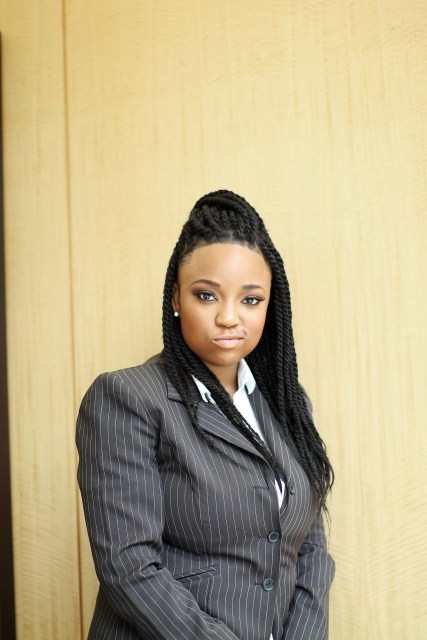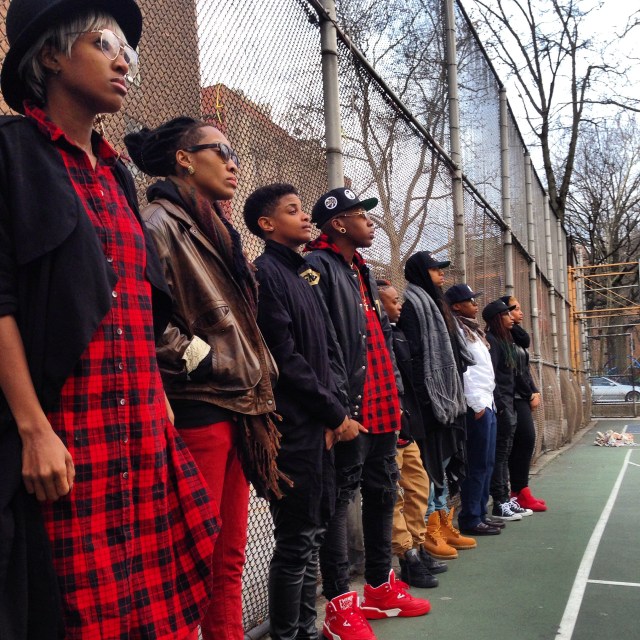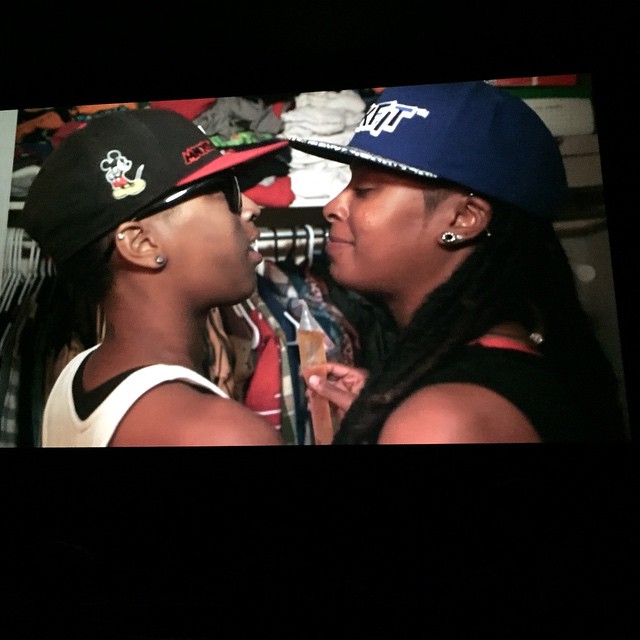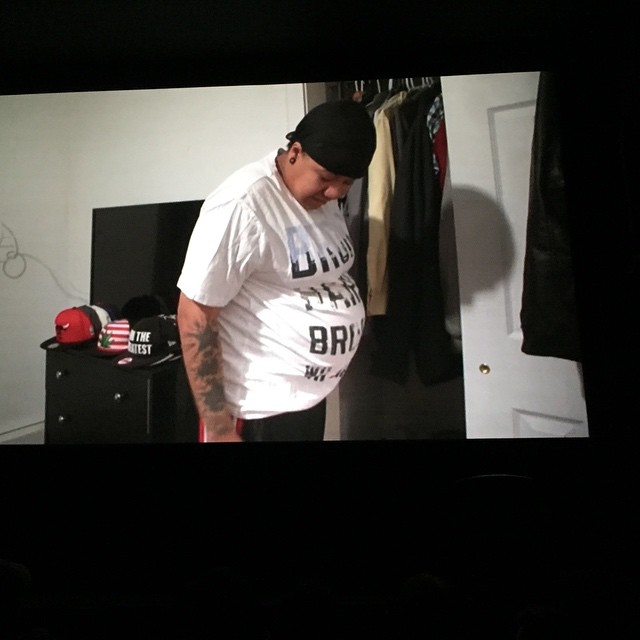There are sooo many rules to being a lesbian these days, especially if you identify as masculine of center (MOC) butch, stud, AG or dom. I also realize that I either break or unwittingly follow most of these rules. I’m accustomed to other masculine of center women calling me out for my “boi spa days” but I’ve never really sat down and asked them why my self-care was so disturbing to them. The question plagues me what does it mean to be a stud? What MAKES you a stud? What knocks you out of that community and WHO decides?
It’s an unfortunate truth that as a community, we police each other’s gender often seeking to see who is a more masculine vs feminine, who is a real stud or how exactly we should behave within gender roles. In the film The Same Difference director Nneka Onuorah takes on many of these questions as she seeks to break down the “rules” or gender stereotypes that we navigate within the black lesbian community. I had the opportunity to check out the film at this year’s Frameline Film Festival in San Francisco. If you were there I was the loud one up front yelling at every “rule” I disagreed with. From the time that the film starts with various studs lined up opposite of each other we understand that this is a film about women who identify in the same way but each embody different images of what a “stud” looks like. None of us are the same.

Director Nneka Onuorah
So what are some of these rules? Some of them listed in the movie included:
- Studs don’t wear makeup
- Studs don’t date other studs (same goes for femmes dating femmes but S4S is much worst)
- Studs don’t have long hair (pretty much every stud has a bald caeser, taper fade or locs)
- A stud can’t get pregnant (once again that’s a femme thing)
- No cross-dressing (your homebois don’t want to see you in heels)
- No flip flopping (if you are a lesbian be a lesbian, I shouldn’t be seeing you with a guy tomorrow)
So admittedly I don’t break THESE particular rules. I threw away my MAC credit card years ago and I stick religiously to my taper fade or feaux hawk. I tried to wear some heels in a butch/femme switch and apparently I’m not good at that anymore either. But I do like other “pretty” things that some may not consider especially butch like getting my eyebrows done or keeping my pedicure appointments. And what if I DID decide to have a baby to make my family whole. Would I be shunned from the community then?

The Same Difference takes the lid off of the many boxes that we as a community put ourselves into in respect to gender. Nneka recalled that she was inspired to take this journey because she had been working in television for 6 years but felt like she hadn’t really made a difference. “I wanted to tell stories that give a voice to the voiceless and give back to a community that I am a part of,” she said. The journey was also a personal one because she recalls coming of age as a young lesbian and how she learned the proper way to “be a stud.” This is a story that is familiar to me as well. It reminded me of being a young butch searching for my identify and what it meant to “look” butch. There have always been elders that took us under their wings to teach us the dos and don’ts. But do those do’s and don’ts truly help us navigate the journey or do they exist solely to self-segregate and create more tiers of discrimination within our own community?
When I left the theater the very first thing that I did was hop on Facebook to proclaim The Same Difference as the best film about black butchness that I had ever seen and I’ve seen all of them — all two of them. There has literally been only two films that give audiences the opportunities to view images of black studs/butches/AG’s/doms and talk about their experiences. The Same Difference approaches the subject in a bit of a different way. The film wasn’t initially conceived as a film about black butches. Nneka’s original concept was to simply start conversations about gender and stereotypes. She went into it openly inviting women of different ages and ethnicities to panel discussions about some of the “rules” presented. The film ultimately found its own way landing on black butchness. For a black masculine of center woman such as myself it felt perfect because it is very rare that we are represented in any form of media deconstructing gender outside of juxtaposing femmes. The goal was to allow those with different opinions about gender and stereotypes to have discussions and get to the root of these stereotypes.
In the film, a new rule appears before each segment. Each of them brought humorous responses both from the participants in the film as well as the audience mostly because NOBODY knows why these are rules! As each of the participants struggled to explain why these rules exist you begin to understand that they are just socialized norms that have been passed down over the years and we just follow them. Nor, one half of the queer rap group Kin4Life made an appearance on camera with fierce makeup beat to the Gawds (translation, very good makeup job) and described her experience as a public MOC woman who loves to wear makeup. I don’t wear makeup but I absolutely understood where she was coming from. I’v had elder butches take me to task about things they deemed “pretty” like getting my eyebrows done and wearing a regular bra as opposed to a sports bra. It was cool to hear Nor’s perspective and then hear other butches around me agree that they too have faced this type of isolation within our community. It really showed how these types of internalized discrimination were felt throughout the community. One of the strengths of the film is the audience being able to sit in on these hard conversations and ask themselves similar questions. What are we comfortable with in terms of how the person next to us performs gender? But also why do we care?
Some of the other rules that were discussed were highlighted by personal stories including a stud on stud (S4S) couple who discussed being ridiculed by their own friends about their relationship. One of the most active moments of the night came when one of their friends talked to them about her disgust of their relationship. The friend basically said studs can’t be with other studs because “that’s gay” and then the couple kissed right in front of her and she recoiled in disgust while the audience cheered and whooped. Their story was interesting because it represented an entire community that consistently faces prejudice for being “gay” and dating someone of the same gender presentation. Go Figure.

We got to meet King Kellz, a stud exotic dancer. Although Kellz has cultivated a large following of women through her performances, she has faced a huge amount of backlash from other studs because she wears a long weave. Kellz displayed a very beautiful, powerful dominance as a butch but is consistently heckled online simply because of her hair. Because obviously you can’t be a masculine presenting woman and have a weave.
A new rule that I never even considered was “studs don’t get pregnant.” We met The Pregnant Stud and I connected with her story so much because, knowing that I have never wanted to bear children, my friends often ask what would I do if my future wife wanted children but could not conceive. We find out that this is exactly the case for this couple. Unfortunately, the way that we get to know them is from the social media backlash they receive from a group of acquaintances.

In order to show the media’s hand in how we read gender, the filmmaker talks with actresses AZ Marie and Snoop Pearson about how Hollywood has treated them as dominant lesbians. This was also a good way to talk about another rule “Studs don’t flip flop.” Actresses like AZ Marie stay active in Hollywood by being able to present as both a dominant stud and a pretty femme which is obviously against the rules. We spent the most time with Snoop who gained fame as the aggressive drug runner also named Snoop on HBO’s “The Wire.” Snoop’s story veered from AZ Marie’s because so many fans have come to see her image as the ideal aggressive butch lesbian and they have been open about not agreeing with her taking more femme presenting roles. Her story is really about being able to pursue her career fearlessly and not being type casted just as an aggressive woman. Watching her learn to walk in heels was worth the admission all on its own.
Many of the participants on the film were in their late 20’s. The director really wanted to focus on young people who were still in the process of learning who they were and maturing their identity. “This film is very important to the young women coming out as lesbian,” Onuorah said. “There is this choice you are faced with when you come out, like what category to choose. I want young women to know that they don’t have to choose a place. Being exactly who they are is ok. Being confident will outshine fitting other people’s expectations of you.”
Although there were only a few elders in the film, there were actually a few present for the initial pre-film panels. “They actually apologized for creating these rules and acknowledged the negative effect they had on our community,” Onuorah said. We must remember that many of these elders came up in a time when they created rules for survival both to navigate without being harassed but also as identifiers to feel safe in their communities. Young people view butchness in a different way now. In discussing masculine identity in the way The Same Difference did, it’s about redefining beauty and how that is not limited to masculine or feminine. We are all allowed to express our beauty how we choose regardless of our gender identity.
One word that was not mentioned in the film directly but was definitely pointed to over and over again was emasculation. That term emasculation carries a lot of weight across the board in the African-American community. As a community masculinity has been viewed as something that can be taken from you by not acting in a correct way. Most of the rules in the film ultimately come down to ways groups try to isolate members of the community and make them feel that they can be pushed out if they don’t conform. As butch women we are already pushing against those norms. I push against these everyday, changing the image of what is masculine with my arched brows and my perfect feet. Part of my gender journey was learning how to ignore the rules and simply be me along the way, embracing those that love my pretty boi tendencies.
The most important takeaway from this film was that each of the featured participants are actively stretching the concept of what butch is so that young women that actually watch the film can see themselves in the community, especially if they are currently in a place where no one looks like them or expresses gender like them.
From here Nneka and The Same Difference continue on the film festival trail stopping next at Chicago’s Black Alphabet Film Festival on July 24. Her hope is to continue to gain support and ultimately secure distribution proving that the black butch community has a voice and the numbers to tell more stories. To learn more about this phenomenal film you can follow it on Instagram or on Tumblr.



Great article, Carolyn! I hadn’t heard of this at all but I’m going to check it out now.
Carolyn, this is a great article! I hadn’t heard of this documentary, but I definitely need to see it.
Great article, Carolyn!
So many thoughts about this because it was something I would worry about when I go to Black (queer) lesbian parties and no one gets my “tomcat femme” vibe or whatever so I’m ignored or stared at. When I find myself at white majority queer parties sure I’m approached but dealing with racism in queer parties, tokenism and all kinds of other-ing fuckery I just want to go home and watch Netflix.
I am happy to say that I have found affirming QTPOC parties and I don’t feel so strange or out of place and I just have fun. So finding a space that you feel you make sense is such a privilege and I hope that as people are aware these spaces can become more inclusive.
I am looking forward to watching this when I am able because I remember watching “Aggressives” and it was interesting seeing the contrast of queer identity and how it changes through class and racial lines. This was great to read and I’ll end up reading this again when I am able to watch the documentary.
I feel this soooo much, like not only am I trying to figure out my queer identity in general there’s also the added stress of feeling like you’re not gonna “fit” in black queer/les spaces. I will join you in hoping for/creating more positive and affirming QTPoC spaces!
I really feel this–especially being multiethnic; there are just so many ways that I’m an “almost” in so many communities. Tell me more about this tomcat femme thing though!
Ohh this is so great, and definitely a conversation that needs to be had more often. I appreciate that this focuses on black butches’ experiences, specifically.
These “rules” really do more harm than good. I think every butch (every queer!) has felt invalidated at one point or another. I remember several people have told me I’m not butch because I’m short and my face is “too femme”? Like, sorry for being a short chicana? And god forbid I carve flowers in my apple pies…ha.
Rules are dumb, and queers are natural rule-breakers. Let’s not forget.
aaa am scared, maybe … i mean.. this does sounds very heteronormative ( i HAVENT watch the movie though).. and like Dante said, are we not here to break/jump/contest the rulez?
I feel no one has the right to dismiss my/ones identity…
Seriously. When a stud/stud couple is called “gay” with a negative connotation, by other queers, we have a huge issue. It’s sad how heteronormativity slithers through even the queer community. I think the documentary is trying to highlight this issue, which is great!
Exactly. Allowing us to define ourselves and feel validated is super important.
Yeah, I still get super surprised when other people in the community try to police gender/appearance/etc. We’re queer! Doesn’t that mean we get to define what we are, who we want, and what we want to look like?
Anyway, I could definitely go for some of that apple pie.
@queergirl For real! It shouldn’t be hard to let people define themselves.
It is fantastic apple pie, if I do say so myself. ;) But y’know, I gotta “butch” it up! Maybe I’ll add flames and motorcycles. Pshhh.
Lol I recommend hand-stamping a bandana pattern into the crust ;-)
I really interested to watch this. But, I don’t understand this stud on stud hate. Studs are women, so isn’t dating non-stud identifying woman also gay? Like are we in our own communities perpetuate this femme-butch(well stud in this case) stereotype that straight & less informed people are making?
I think it might be because lesbophobia and hatred of man-on-man are two very different streams flowing from the same mountain. I think this shows that one can fight one’s ingrained lesbophobia without ever addressing one’s equally ingrained disgust towards the erotic association of two masculine people.
<3
I feel lots of ways about these things and don’t even have the words to get into them here, but I’m going to be in Chicago this weekend so mayyybe I should try to go check this film out. And then try not to psych myself out about what boxes I may or may not fit into as a queer black person who isn’t femme but has an aversion to identifying with masculinity as a concept. Mmhm.
This sounds super interesting! I wrote my women’s studies thesis on queer fashion, and one article that touched a bit on this and I would highly recommend is Mignon Moore’s “Lipstick or Timberlands? Meanings of Gender Presentation in Black Lesbian Communities.” I wish I had known about this documentary then – I would have loved to include it!
This looks so good – thanks for writing about it, Carolyn.
watching that video made me all kinds of scared that I won’t be accepted for being an androgynous non-binary bisexual white kid. those rules scare me because i’m all sorts of flip floppy in terms of gender, who i’m attracted to, and gender presentation, and a lot of people don’t like that. as just a baby queer (18), i sure hope that becomes less prevalent in people my age.
(probs wasn’t necessary for me to include that i’m white in that particular phrase. I won’t experience much of a lack of acceptance for being white.)
Hey, fellow non-binary white person! (It’s actually pretty important and helpful that you mention that.)
While I get that you’re anxious, it’s not cool to derail this conversation, that is very explicitly about gender as a black person, onto your own feelings of fear or rejection.
Carolyn mentions in the article that this is the second movie she’s ever seen about black butches/studs. This should tell you something about how important a comment section like this would be for black queers and other poc who want to share their feelings on the subject.
Unfortunately, spaces like this are a limited resource, so it’s rude, for us as white people, to hog them to talk about our own issues that are informed by a racially privileged perspective. I can promise you there are other occasions.
You are welcome to message me anytime about the concerns you mentioned – I share most of them and can maybe offer some wisdom.
I think this was supposed to give me less anxiety overall, but really, only gave me more. I’m recently out and already have heard the jokes (I think they are jokes?) about picking what type of lesbian I will be. F*** it. Why should I pick anything? Can’t I just be me? (No, seriously, do I have to pick?!)
That said, it was fantastically written, and I really appreciated reading it. Thanks, Carolyn. :)
you don’t have to or need to choose anything you don’t want to Katie. Anyone who tells you otherwise, run swiftly in the opposite direction. you won’t be needing that level of dumbASSness in your space
if of course it’s coming from someone you want to keep around, enlighten them to the fact that your life is lived only by you, and they can respect that, or move on.
I hope to see this if it comes to Australia. Sound incredible!
According to their Facebook page, they’ll end the tour in Australia by February 2016. I’m going to ask when exactly. I’m guessing they’re very likely going to go to Melbourne and Sydney. I’m crossing my fingers they do!
Damn! Those rules are so real though, and it’s great to see that Nneka found a way to bring people together to talk about that. Seeing everyone standing in a line, showing the variations of what a “stud” can be really hit me.
I look forward to watching this. I have to wait for February but I get the feeling it’ll be worthwhile, especially if it opens up discussion.
Thanks for the lovely article, Carolyn. Also, I love my spa and self care days too.
I loved this article, thank you.
Wow thanks for the amazing article thoroughly reviewing what sounds like a very important film!
How refreshing to have this conversation! Thanks….
But where can you watch the documentary or how can you bring it to your city?
This was great. Thanks
Very enlightening article
This is really fascinating, thank you!
Great article! For many years my wife dated black butches (she’s white, femme and I am from another planet) and through her eyes I get occasional glimpses into this world she used to live in, and the fun of butch/femme and its rules and limits and codes, especially for the butches.
I want to see this now. Thanks for writing this piece!
Absolutely wonderful article! This is a very interesting read as a fellow lesbian, what other tour dates are available except the one on the 24th of July??
I need to find a way to see this omggggg. Not only am I doing a research paper this fall about studs and how they practice masculinity, I’m also seeing a stud right now with a really rigid idea of masculinity (that we are slooooooooooooooooowly trying to change) and I feel like she would really enjoy this too!
Very informative piece – thank you for the rec/review!
The documentary seems interesting.
I am curious: is the message to stretch the definition of masculinity OR get rid of the definition of masculinity?
How far are we to stretch “masculinity”? So that everyone who sees themselves as masculine can be accepted as masculine? Or is the goal to stop caring about labels all together? Maybe it is best that we do not have labels at all since there is so many broad, overlapping definitions LOL
Excellent piece, Carolyn! I need to check out this flick.
I’m so happy to have read this because it’s truly enlightening. I saw the documentary on Instagram and I’ve just been waiting to find out when I’ll be able to see it since I’m in stl. But it’s 100% true about these rules that have been created and that it is more for the black lesbians than other races which is a shame.
This is so important. Thank you for writing this, Carolyn! I saw a documentary on Netflix a while ago (which I cannot find to reference right now) which had so much potential to confront the dynamics among MOC Black women, but fell short. I look forward to seeing The Same Difference when it makes its way to Philly.